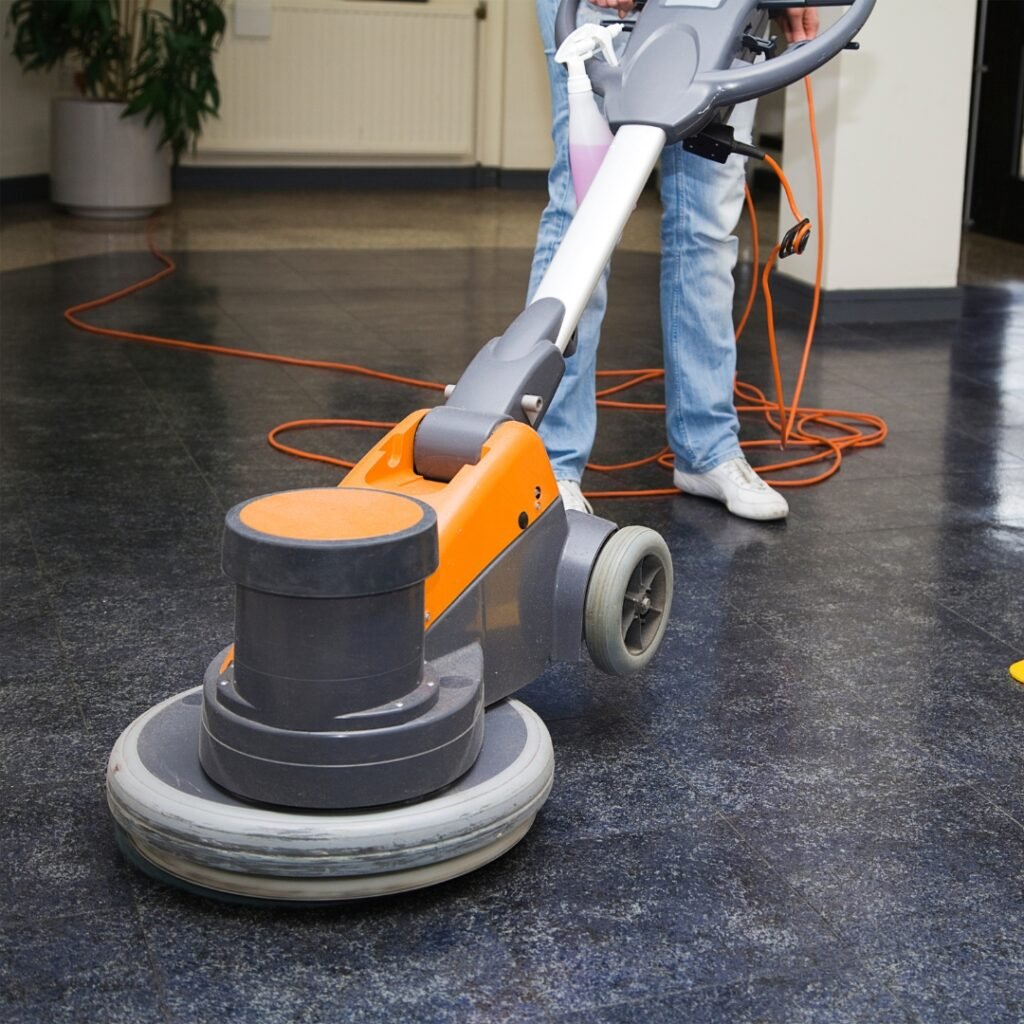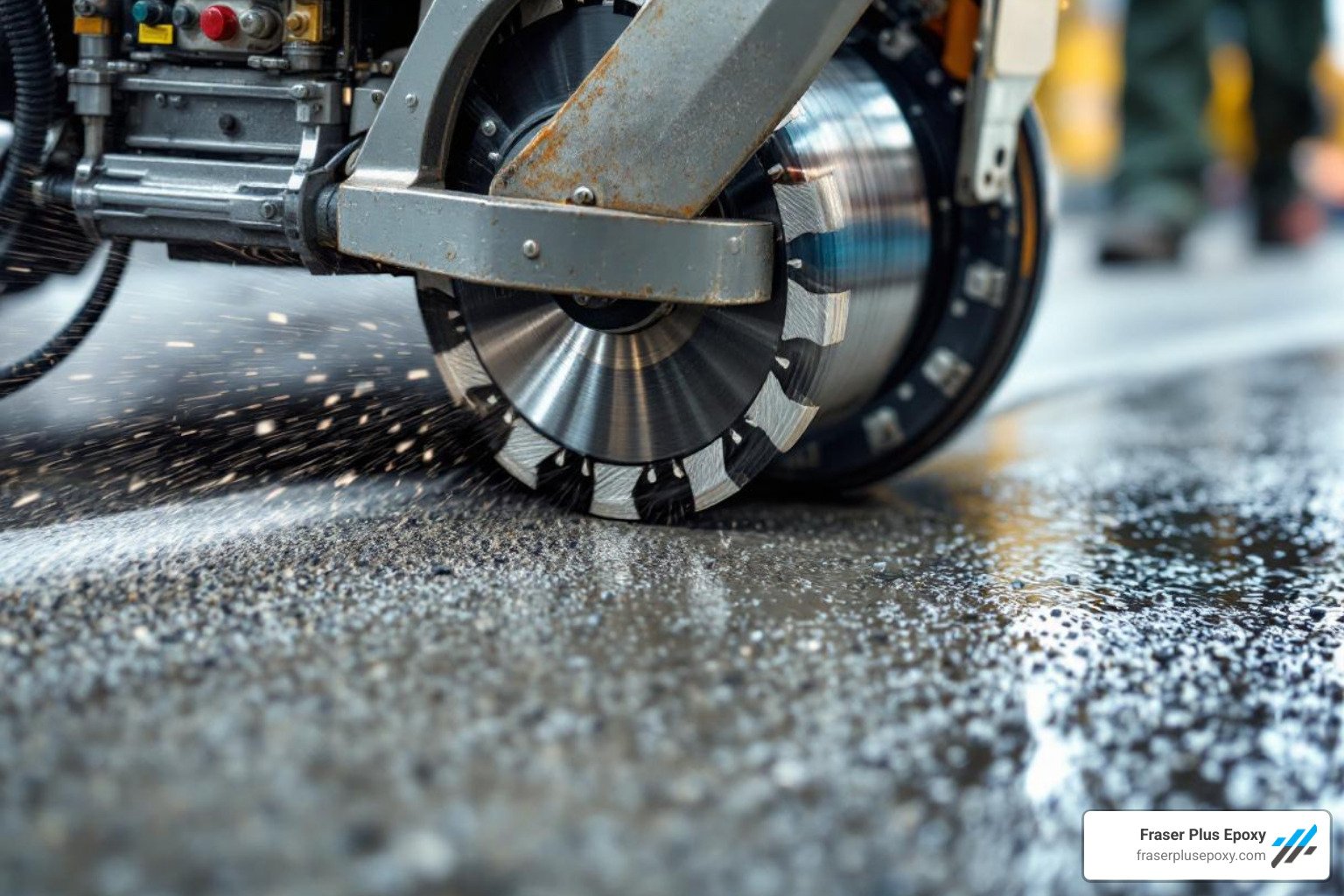Concrete polishing is rapidly gaining traction in Vancouver as a sustainable, durable, and aesthetically appealing flooring solution. Fraser Plus Epoxy, a leader in epoxy and concrete flooring services, showcases its expertise by delivering polished concrete floors that meet the highest industry standards.
What is Concrete Polishing ?
Polished concrete involves mechanically grinding and honing a concrete surface to achieve a smooth, high-gloss finish. This process uses chemical densifiers to harden the concrete, ensuring durability and resistance to wear. It transforms ordinary slabs into visually stunning surfaces suitable for residential, commercial, and industrial spaces.
Environmental Advantages of Polished Concrete
Polished concrete is one of the most sustainable flooring options available today. Here’s why:
- Reduced Material Waste: Polishing utilizes existing concrete slabs, eliminating the need for additional materials like carpets or tiles. This minimizes construction waste and reduces the carbon footprint associated with manufacturing new flooring materials.
- Energy Efficiency: Polished concrete reflects light effectively, reducing the need for artificial lighting by up to 30%. This energy-saving feature is particularly beneficial for large spaces like warehouses and retail outlets.
- Low Maintenance: Unlike other flooring options that require harsh chemicals for cleaning, polished concrete can be maintained with water-based solutions. This reduces environmental harm caused by cleaning agents.
Durability and Longevity
Polished concrete is renowned for its exceptional durability:
- Resistance to Wear: The densification process increases the surface strength of concrete, making it resistant to scratches, stains, and heavy foot traffic. This is ideal for high-traffic areas such as shopping malls and industrial facilities.
- Long Lifespan: Polished concrete can last decades with minimal maintenance. Its lifecycle cost is significantly lower compared to alternatives like hardwood or carpet.
- Moisture Management: In damp environments like basements, polished concrete allows moisture to wick through rather than trapping it under flooring materials. This prevents mold growth and structural damage.
Aesthetic Appeal
Polished concrete offers unparalleled design flexibility:
- Customizable Finishes: From satin to high-gloss finishes, polished concrete can be tailored to suit various aesthetics. Dyes, pigments, and patterns can be added for unique designs.
- Versatility: Suitable for modern minimalist interiors or rustic industrial spaces, polished concrete seamlessly integrates with diverse architectural styles.
- Enhanced Lighting: The reflective surface brightens spaces naturally, creating an inviting ambiance while reducing lighting costs.
Cost Efficiency
In Vancouver, polished concrete costs range between $4–$8 per square foot for residential basements and slightly higher for commercial spaces depending on customization. Despite the upfront investment, its long-term savings on maintenance and energy make it a cost-effective choice.
Technical Process of Concrete Polishing
Fraser Plus Epoxy employs cutting-edge techniques in grinding, honing, and polishing concrete to deliver flawless results. Their expertise ensures polished floors meet industry standards for durability, aesthetics, and safety. Below is a detailed breakdown of their process:
Step 1: Assessment and Preparation
The first step involves evaluating the condition of the concrete slab to ensure it is suitable for polishing. Fraser Plus Epoxy’s team conducts a thorough inspection to identify cracks, uneven surfaces, or existing coatings that need removal. Key preparation steps include:
- Crack Repair: Filling cracks and joints with epoxy or semi-rigid fillers ensures a smooth surface for grinding.
- Coating Removal: For thick coatings, Fraser Plus Epoxy uses aggressive tools such as 16- or 20-grit diamond abrasives to strip the surface efficiently.
- Surface Cleaning: Dust, dirt, and debris are removed using industrial-grade vacuums and degreasers to ensure optimal adhesion during densification.
Step 2: Grinding
Grinding is the cornerstone of the polishing process. Fraser Plus Epoxy uses planetary grinders equipped with diamond-segmented abrasives to refine the surface gradually:
- Initial Grinding: Coarse diamond tooling (30–40 grit) removes imperfections and levels the concrete.
- Intermediate Grinding: Medium grit (80–150 grit) smooths the surface further while preparing it for densification.
- Edge Grinding: Specialized edge grinders ensure uniformity along walls and tight corners.
This meticulous approach prevents uneven finishes and guarantees a consistent base for subsequent steps.
Step 3: Densification
Chemical densifiers are applied to harden and strengthen the concrete. These densifiers penetrate the surface, reacting with calcium hydroxide to form calcium silicate hydrate (CSH), which improves durability and resistance to wear. Benefits of densification include:
- Enhanced hardness (up to 4,000 psi compressive strength).
- Reduced porosity, making the surface resistant to stains and moisture.
- Improved bonding for finer polishing stages.
Step 4: Polishing
Polishing transforms the concrete into a visually stunning surface with varying levels of sheen. Fraser Plus Epoxy employs a multi-step polishing process:
- Initial Concrete Polishing: Using resin-bond diamonds (100–200 grit), they begin refining the surface.
- Intermediate Polishing: Higher grit levels (400–800 grit) are used to achieve a semi-gloss finish.
- Final Polishing: Ultra-fine diamonds (1,500–3,000 grit) create a mirror-like gloss suitable for high-end applications1.
Optional stain guards can be applied during this stage to enhance protection and simplify maintenance.
Step 5: Safety Standards
Fraser Plus Epoxy ensures that polished floors meet OSHA guidelines for slip resistance. Their team uses advanced testing methods to verify compliance, making their floors ideal for public spaces where safety is paramount.
Why Choose Fraser Plus Epoxy?
Fraser Plus Epoxy stands out in Vancouver’s competitive Vancouver concrete polishing market due to:
- Decades of experience in epoxy and concrete flooring solutions.
- Commitment to sustainability by promoting eco-friendly practices.
- Customization options tailored to client needs.
A Sustainable Choice for Vancouver Concrete Polishing
Concrete polishing combines durability, aesthetics, and environmental benefits into one versatile solution. Whether you’re renovating a basement or outfitting a commercial space in Vancouver, Fraser Plus Epoxy’s expertise ensures top-tier results that align with sustainability goals. Reach out to us for more information about Fraser Plus Epoxy’s services or to request an estimate.
FAQs
- How long does the concrete polishing process take?
The timeline varies based on slab size and complexity. For residential projects, Fraser Plus Epoxy typically completes polishing within 3–5 days, while commercial spaces may require 1–2 weeks. Their team works efficiently to minimize downtime for businesses. - Can polished concrete be installed outdoors?
Yes, but with caveats. While polished concrete is durable, outdoor exposure to UV rays and freeze-thaw cycles can degrade the finish. Fraser Plus Epoxy recommends sealing outdoor surfaces annually and using specialized coatings for enhanced protection. - Does Fraser Plus Epoxy offer maintenance services?
Yes! Their team provides post-installation care packages, including periodic re-polishing and stain guard applications, to extend the lifespan of your floor. - Is polished concrete suitable for homes with pets?
Absolutely. Polished concrete resists pet stains and odors better than carpets or hardwood. Fraser Plus Epoxy’s stain-resistant finishes make cleanup effortless. - How does polished concrete compare to epoxy flooring?
Both are durable, but epoxy offers vibrant colors and seamless finishes, while polished concrete provides a natural, high-gloss aesthetic. Fraser Plus Epoxy specializes in both—contact us to determine which suits your needs.
People Also Ask
- Can I DIY polished concrete?
While possible, DIY polishing risks uneven finishes and safety hazards. Fraser Plus Epoxy’s professionals use industrial-grade equipment and safety protocols to ensure flawless results. - How does polished concrete handle extreme temperatures?
Polished concrete tolerates temperature fluctuations well, but rapid changes (e.g., Vancouver’s freeze-thaw cycles) may cause minor cracking. Fraser Plus Epoxy’s densification process minimizes this risk. - Is polished concrete hypoallergenic?
Yes! Unlike carpets or rugs, polished concrete doesn’t trap allergens like dust mites or mold. It’s ideal for homes with allergy sufferers. - Can polished concrete be repaired if damaged?
Minor scratches or stains can often be buffed out. For deeper damage, Fraser Plus Epoxy offers targeted repairs to restore the floor’s original sheen. - Does Fraser Plus Epoxy work with architects and contractors?
Yes! They collaborate with Vancouver’s top builders to integrate polished concrete into new construction projects, ensuring seamless execution from design to completion.


